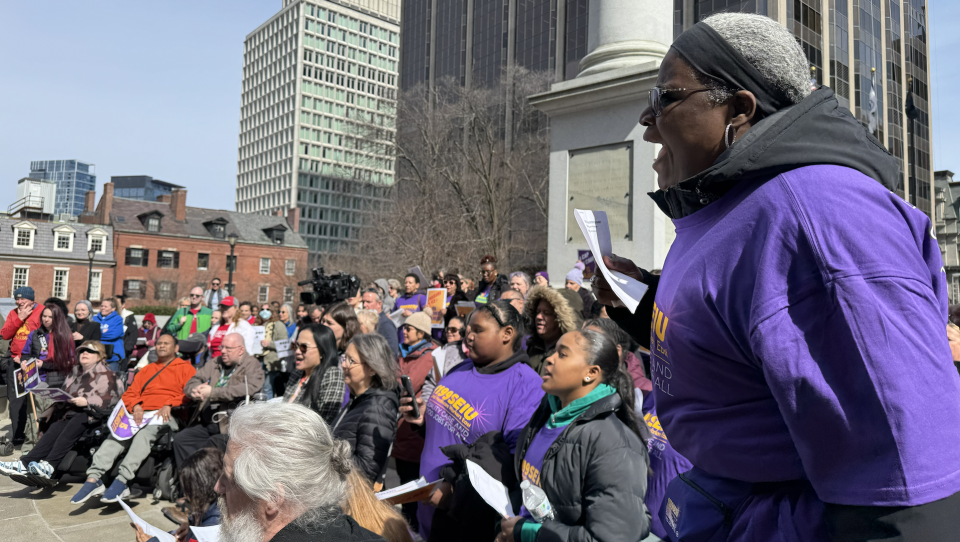Disability advocates rally against proposed cap on in-home aides
March 12, 2025

Hundreds of disability advocates gathered at the State House in Boston Wednesday for a rally to support the state program that provides caregivers to help people with disabilities and seniors live at home instead of in nursing facilities.
The Personal Care Attendant (PCA) program — part of MassHealth — serves more than 50,000 people across the state, but Gov. Maura Healey is eyeing caps in next year’s budget that would slow the growth of the program.
PCAs help people with daily living tasks like meal preparation, using the bathroom, getting dressed and getting out of bed. PCAs are hired and trained directly by the disabled “consumer.”
Last year, the Healey administration’s proposed budget would have removed 6,000 people from the program. But advocates pushed back and the legislature did not make cuts.
The PCA program annual costs have grown, from about $1.2 billion in 2020, to an estimated $2 billion by 2027. Due to projected rising costs, the Healey administration is proposing a cap that would tie spending on the program to benchmarks set by the Health Policy Commission in 2026.
Advocates say that could result in people not getting PCA services, or PCAs not getting wage increases in the future.
But the state says it would help put the program on a “ sustainable long-term fiscal trajectory. ”
“Our proposed budget does not make any cuts to the PCA program in FY26,” said Stacey Nee, a MassHealth spokesperson, in a statement to GBH News. “PCA spending continues to grow as a share of the state budget at an unsustainable rate. We propose aligning the program with other areas of health care spending in order to ensure that the program remains sustainable for the members who rely on it most.”
Matt Pellegrino, executive director of Northeast Independent Living Program, attended the rally and said the PCA program is unique in the level of care it provides. He said the increase in cost to the program shows how important it is.
“The program grows because the need is there, and there’s no other alternative to this program,” he said. “There [are] different services that might help someone in the home, but not at the same level, not with the self-direction that the program allows.”
State Senator Robyn Kennedy said that in the long run, the PCA program is still more cost-effective for the state.
“Compassion is cost-effective. Caring for people is cost-effective,” Kennedy said at the rally. “Arbitrary caps will not save us money. It will hurt individuals and put costs on other parts of our system … The most cost-effective care is home care. It’s helping individuals stay with their family, stay with their community, stay at home.”
Murshid Buwembo, a wheelchair user who works at the Boston Center for Independent Living, said that PCAs are a “driving engine” for people with disabilities.
“Without them we cannot go to work, we cannot live a better life,” he said. “If I’m working, I also pay taxes … I’m also part of that economic cycle.”
“Wheelchair users are humans too and we have to treat them like they are humans,” said Janice Guzman, a PCA, speaking in Spanish.